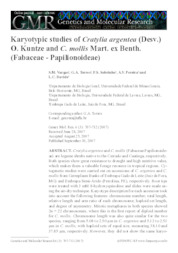Karyotypic studies of Cratylia argentea (Desv.) O. Kuntze and C. mollis Mart. ex Benth. (Fabaceae - Papilionoideae).
Karyotypic studies of Cratylia argentea (Desv.) O. Kuntze and C. mollis Mart. ex Benth. (Fabaceae - Papilionoideae).
Resumo: Cratylia argentea and C. mollis (Fabaceae-Papilionoideae) are legume shrubs native to the Cerrado and Caatinga, respectively. Both species show great resistance to drought and high nutritive value, which makes them a valuable forage resource in tropical regions. Cytogenetic studies were carried out on accessions of C. argentea and C. mollis from Germplasm Banks of Embrapa Gado de Leite (Juiz de Fora, MG) and Embrapa Semi-Árido (Petrolina, PE), respectively. Root tips were treated with 3 mM 8-hydroxyquinoline and slides were made using the air-dry technique. Karyotype description for each accession took into account the following features: chromosome number; total length, relative length and arm ratio of each chromosome; haploid set length, and degree of asymmetry. Mitotic metaphases in both species showed 2n = 22 chromosomes, where this is the first report of diploid number for C. mollis. Chromosome length was also quite similar for the two species, ranging from 5.08 to 2.50 µm in C. argentea and 5.12 to 2.51 µm in C. mollis, with haploid sets of equal size, measuring 38.10 and 37.85 µm, respectively. However, they did not show the same karyotypic formula, which was 5 m + 4 sm + 2 st for C. argentea and 7 m + 2 sm + 2 st for C. mollis. This indicates the occurrence of rearrangements within chromosomes I and VI. Both karyotypes showed a tendency for asymmetry.
Ano de publicação: 2007
Tipo de publicação: Artigo de periódico
Unidade: Embrapa Gado de Leite
Palavras-chave: Chromosome evolution, Cratylia argentea, Cratylia mollis, Karyotype, Tropical forage, cytogenetics
Observações
1 - Por padrão são exibidas publicações dos últimos 20 anos. Para encontrar publicações mais antigas, configure o filtro ano de publicação, colocando o ano a partir do qual você deseja encontrar publicações. O filtro está na coluna da esquerda na busca acima.
2 - Para ler algumas publicações da Embrapa (apenas as que estão em formato ePub), é necessário ter, no celular ou computador, um desses softwares gratuitos. Sistemas Android: Google Play Livros; IOS: iBooks; Windows e Linux: software Calibre.
Acesse outras publicações
Acesse a Base de Dados da Pesquisa Agropecuária (BDPA) para consultar o acervo completo das bibliotecas da Embrapa.

